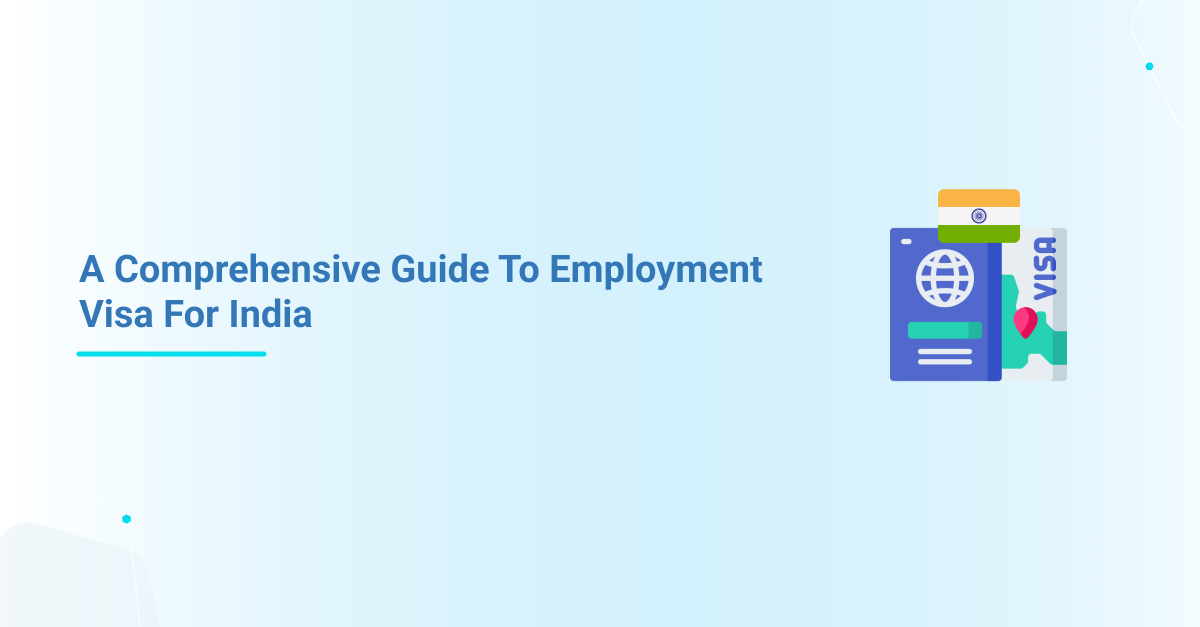A Comprehensive Guide to Employment Visa for India

Embarking on the journey to obtain an employment visa in India may initially appear overwhelming. Yet, with the right guidance and insights, this path can be navigated with ease. Our guide is meticulously crafted to demystify the process, offering insights crucial for successful employment visa application for India.
Summary
Decoding India's Work Visa Types
India offers a range of work visas, each catering to different professional needs, including Employment Visa, Business Visa, Project Visa, Conference Visa and Permanent Residency Status. Choosing the most suitable visa type is a critical for successful application. For more detailed information on these work visa categories, click here.
For secondments or local hiring by Indian companies, the Employment Visa is typically the appropriate choice.
Things to Consider for an Employment Visa
Now that we understand different types of work visas for India, let's delve deep into some key aspects to be considered when applying for an employment visa.
Applying Visa Under Correct Category
Choosing the right visa category is vital, especially when the expat's role doesn't fit the traditional employer-employee relationship.
Some instances where an Employment Visa (and not Business Visa) is required include:
- Foreign nationals contracted as consultants or for fixed remuneration by Indian companies (not necessarily paid monthly)
- Performing Artists engaged for regular performances by Indian hotels, clubs, or organizations.
- Sports Coaches and Players for national/state sports teams or clubs
- Technical Experts and Engineers involved in installing and commissioning equipment.
- Skilled foreign professionals in IT and IT-enabled sectors
- Specialized Occupations like foreign language teachers, specialist chefs, and technical staff for knowledge transfer or service provision
- Foreign nationals contracted as consultants or for fixed remuneration by Indian companies (not necessarily paid monthly)
Choosing the Right Visa Sub-category
Selecting an appropriate visa sub-category is equally critical as choosing the visa type itself, as it reflects the nature of the expatriate's role with the Indian organization.
- Local Hires: Expatriates employed directly by the Indian company should apply for an Employment Visa under the E1 subcategory.
- Inter-Company Transfers: For expatriates on inter-company transfers within the group entities, the E2 subcategory is more appropriate.
Recent judicial developments have pronounced secondment arrangements as 'manpower supply' by the home entity. Particularly in the arrangements where even during secondment term, the home entity typically retains its role as the employer, with expatriates maintaining a strong employment nexus and lien on employment with the home entity.
To navigate these legal intricacies, many companies are now opting to fully integrate expatriates into their Indian operations. This approach involves onboarding expatriates as local employees of the Indian entity, with expats payroll being completely transferred to India. In such scenarios, applying for an Employment Visa under the E1 subcategory becomes vital in substantiating that employment relationship exist only between the expatriate and the Indian entity.
Understanding Salary Threshold and Specific Exceptions
To qualify for an employment visa in India, a foreign national is required to meet a minimum annual salary threshold of USD 25,000, which equates to approximately Rs. 1.625 million. Notably, there are exceptions to this requirement for specific roles such ethnic cooks, language teachers, translators, embassy or high commission staff, and foreigners engaged in honorary work with NGOs.
The total annual salary encompasses not only cash payments but also the value of perquisites and benefits provided to the expatriates. It is crucial to recognize that applications with a salary structure marginally meeting the threshold may attract closer scrutiny. Officials might question the rationale behind hiring an expatriate for a role that could potentially be filled by local talent.
Payroll Location
The payroll location for expatriates can vary, often being processed in the home country, host country (India), or we may even see a split payroll between the two locations. Historically, the location of payroll has not been a significant concern from an immigration perspective. However, recent developments have seen a shift in this approach. Certain embassies, including those of Germany and Hong Kong, now explicitly state on their websites that expatriates applying for an Employment Visa are required to be remunerated within India. This shift mandates that the payroll location complies with the specific requirements of the embassy processing the visa application.
For a comprehensive insight into the complexities and challenges surrounding payroll locations for expatriates, click here.
Justifying Hiring of Expats
Embassies may also require a justification for employing expatriates in India, particularly if qualified local candidates are available for the intended role or position.
Addressing such requirements, visa documentation may also be supported with:
- Company Background: Brief outline of company's background along with specific reasons for hiring expatriates. Particularly in case of intra group transfers expatriates are often tasked with implementing group-level policies, practices, and imparting training to the local workforce. Such details illustrate the unique contributions and knowledge transfer that justify the hiring.
- Project and Skill Details: It's crucial that the visa documentation highlights expatriate’s skills along with the project details that they will undertake and their role in execution.
- Local Hiring Efforts: For non-technical or generic positions, the visa documentation may also be accompanied with justification highlighting Indian entity's attempts to recruit locally for the position. This demonstrates that hiring an expatriate was a considered decision, made after exploring local talent options.
Educational/Technical Certificate Apostille
During the visa application process, embassy officials may request notarised or apostilled educational and technical documents. It's essential to anticipate this requirement and complete the notarisation or apostille process in advance. Additionally, if these documents are not in English, they must be translated and notarised in English.
Documentation Checklist
While each embassy might have specific requirements, the following is a general list of documents typically required for an employment visa application:
- Duly completed Visa Application Form.
- Copy of Passport.
- Recent Passport-size Photograph.
- Undertaking and Request Letters from the Indian Employer.
- Invitation Letter from the Employer.
- Appointment Letter / Employment Contract.
- Certificate of Incorporation of the Employer.
- Educational and Professional Certificates.
- Copy of Previous Visa (if applicable).
- Details of the Home Entity (for intra-company transfers).
Additional Important Aspects:
When applying for an employment visa, remember:
- The visa must be issued from the country of origin or the country of domicile, provided the expatriate has had permanent residence there for more than two years.
- Original and signed supporting documents like invitation letters, undertaking letters from the employer, admission letters, and recommendation letters should be submitted. Scanned copies might not always be accepted.
Navigating the work visa process in India requires careful attention to multiple factors. Proper planning and guidance can significantly lower the risk of selecting an incorrect visa category or facing rejection from embassies.
